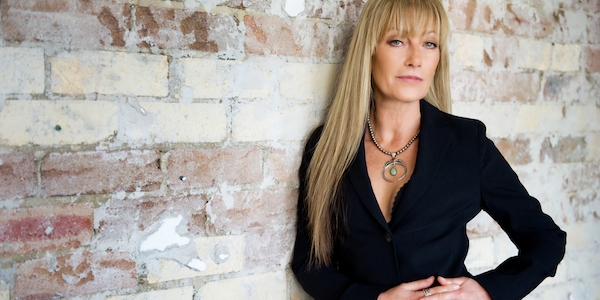“I guess now is a good time to celebrate what I’ve been doing for two decades.” Matthews says in accent equal parts Canadian and Australian. “Show some sort of evidence of employment. I’ve been a bit of a freak for most of my life in that I’ve never had a real job. This is all I’ve ever done and it has totally determined the course of my life.”
Her future direction became a little clearer when, while living in LA in 1983, Matthews – who was getting casual work as a session singer – by chance met legendary Australian singer Glenn Shorrock, who convinced her to sing on his album and fly to Sydney to tour in his band. “Glenn was the sort of guy that would come off stage after a gig and still want to sit around the piano and play music just for fun, so we had no problems connecting.” Wendy recalls. Her motivation to start a new life in Australia however was hampered at first by a fear of rejection by what she perceived as an unforgiving pub-rock scene.
“My first experience of a female singer who’d made it in Australia was Chrissie Amphlett of Divinyls and it kind of scared the crap out of me, because she had this machismo – it was a very male oriented rock scene – and I thought I was never going to be accepted into that world.” Matthews was not only, but was in hot demand as a session singer with many top rock acts.
“I glimpse back to those times and I’m so grateful to those bands.” For the rest of the 1980s, Matthews’ singer/songwriter roots were largely put on hold while she bumped shoulders with the crème of Aussie rock – Icehouse, Models, Richard Clapton, Barnes – though she dabbled in advertising jingles to keep the land lord off her case. She laughs, “Not everything I did back then I’m proud of.”
After Matthews performed on three of the biggest Australian albums of the late ‘80s – Models, Out Of Mind Out Of Sight, The Rockmelons, Tales Of The City and Kate Ceberano’s You’ve Always Got The Blues – her rise to top billing artist was almost in the bag. The turning point came when Models split in 1989, resulting in the James Freud-led Beatfish and, importantly for Matthews, her then-partner Sean Kelly’s project, Absent Friends. At last the Canadian chanteuse was on lead vocal for the 1990 single, I Don’t Want To Be With Nobody But You.
“Things come in waves, and I guess that was my time for things to work out, but I know now that it’s impossible to keep the vibration going at such a high level for very long. I mean the thing about being independent is that you don’t get that level of marketing which is what labels are so good at and so I see that time as wonderful, but also impossible to repeat.” Absent Friends only saw out the year before Sean Kelly split the band to form The Dukes, while Matthews went on to record Émigré – her solo debut which spawned the hit Token Angels.
30-years-old, having spent half of her life performing, Matthews acknowledges the weirdness of her bestowed ‘best new-comer’ status. “I’ve debuted more times than I can count,” she exclaims. “I guess my debut was as a singing goat on Sesame Street, really.” It’s hard not to get sidetracked by Matthews’ Sesame Street connection, but the wow moments keep piling up. A support slot on James Brown’s Australian tour led to Matthews sharing the stage with the Godfather for a couple of songs. “It almost doesn’t feel real.” Wendy acknowledges, “It’s like I’m talking about somebody else’s experience.” Many great music moments have come and gone for Wendy, but her finest hour was less a personal experience than a song Australian’s claimed as their own.
“I was terrified of releasing The Day You Went Away into the climate of what was on radio at the time. I mean it was just a piano and heartbeat and I thought I was gonna be eaten alive, but that song proved to me that your average radio listener out there was wanting different stuff to what was being offered.”
The Day You Went Away – from Matthews’ second album, Lily – was arguably given gravitas by the fact Australian’s were still serving in the first Gulf War. Coupled with a video depicting a couple separated by war, the single outsold every other local release that year, which finally dissolved Matthews’ old fear of being seen as an outcast in the ‘hedonistic Aussie rock scene.’
“I’m somebody who loves to be moved by music, and the success of that song proved I was in good company.” She says, “But you know, reactions to it have been so, so varied, I mean I have had women say to me, ‘Nothing helps my baby get to sleep like your voice in that song. So for a while I thought, ‘Oh my god, I’m going become known as the baby whisperer.’”

